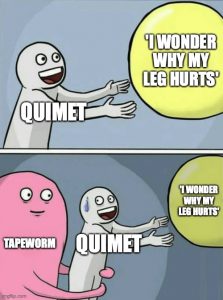For this week, we were given the task of reading Amulet by Robert Bolaño. I found this to be one of the best books we’ve read in this course so far. This book, like many of the other ones, have the consistent theme of memory, and I think repetition. The story is one long monologue, from Auxilio’s perspective. I seem to enjoy Auxilio as a character, “the mother of all young Mexican poets”. Something about her makes me really like and sympathize with her, especially when she’s recalling traumatic memories like the bathroom (which she recalls A LOT… repetition amirite?), or having to find accommodation while not wanting to overstay her welcome. One of the most quotable moments I read in the book was, “I lost my teeth but not my discretion, my tact, my sense of propriety” (Bolaño, 37). That was a very memorable line for me. It’s like she just wants to fit in, but also float around, which I find kind of cool. Auxilio doesn’t have many material possessions, but I think she possesses a lot of character and individuality which I noticed while reading. Something that I found a bit confusing during my reading was the constant references to ‘ash’ and damage, which I infer is reference to the revolution, the army occupation of UNAM, or of the coup (I can’t narrow which one is the best fit). It’s like her mind is dusted and ashy in a way. On another note, I felt as if Auxilio was always just sort of around. I say this especially due to the fact that the story is set up in a quite fragmented manner. The narrator is constantly recalling different stories to create one (I hesitate to call fluid, but I might play with the idea of it) narrative that is like her life. For example, there was a solid shift between hearing about Auxilio’s friend, and then hearing a ton about Arturito and Ernesto. Both memories are being called from different times in Auxilio’s life, but are almost told as a story; like she has already lived these moments.
I really think that the narrators point of view is interesting, but slightly frustrating at the same time. I like how readers get a very raw sort of perspective from Auxilio, to the point where you can see that she’s still trying to think of her older memories and having difficulty recalling them as well. However, the crux of the matter is this, which leads to my question of the week: How do you think the narrative point of view limits what the readers get from the whole story? To simplify the question a bit more, do you think that Auxilio’s way of narration limits what we know? Auxilio seems like an unreliable narrator who is not telling us everything, which only gives us a certain amount of understanding of the story. I think that if the way the story was narrated (without an unreliable narrator), there is a good chance we would have a different story, or the same story but with different information. For example, I think there is a good chance that we would learn more about Juan and how he got into the situation with the King; maybe it was intentionally written so that we’d never know. However, its always interesting to think about how stories could be different if tweaks were made to a character or narrative style.
With all this said, I would recommend this book especially due to its quotable nature. There are many lines I will continue to think about, especially these two (because I couldn’t choose one; “memory plays malicious tricks on me when the light of the waning moon creeps into the women’s bathroom like a spider” (101), or “If you have friends you’re never alone (61).
